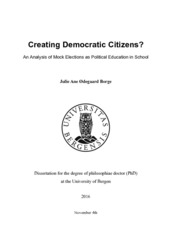Creating Democratic Citizens? An analysis of Mock Elections as Political Education in School
Doctoral thesis
Permanent lenke
https://hdl.handle.net/1956/13138Utgivelsesdato
2016-11-04Metadata
Vis full innførselSamlinger
Sammendrag
Mock elections at school have been a part of the political education in Norway since the end of the Second World War, and have become an institution of political education. One of the main objectives of democratic institutions is to create democratic citizens. Nonetheless, no one has yet researched mock elections as political education. In this dissertation, I define the concept of mock elections in the Norwegian context, and show why a study of the Norwegian case, with youth politicians visiting the school, is an important research contribution to the currently limited knowledge about mock elections as political education. I examine the role mock elections at school play in motivating young people towards political participation through a mixed methods study combining both qualitative and quantitative approaches. I argue that mock elections at school can be defined as top-down (TD) political education that simulates an ordinary election with the main objective of stimulating turnout among the future generation of voters. A main finding from the fieldwork is that mock elections as political education in school present voting as the norm and that students vote in the mock elections because they are told to do so, and not as a way of expressing the political identities of youth today. The results of a logistic regression analysis (N=1611) show that voting in mock elections at school has a positive impact on students' willingness to vote in Parliamentary elections. There were no significant effects of participating at the school debate or the election square. I argue that one of the things that matter for whether the students accept or reject the political identities presented in the mock elections is whether they are able to identify with the politicians and the party members who visit the school. The interview data suggests that the politicians in the school debate are interpreted as being different from the students in school as well as distinct from the image the students have of politicians. Accordingly, the mock elections present political identities that the students who are not themselves active in political parties distance themselves from. Consequently, mock elections as political education in practice is a simulation of an ordinary election. Meanwhile, the voice of youth in the present is neglected. The findings in this dissertation suggest a political education in schools that educates students for political participation in the future rather than the present.
Består av
Paper I: Borge, J. A. Ø. Skolevalg og politisk motivasjon - En kvalitativ studie av grunner skolevalget gir for hvorfor ungdom skal delta i valg. Tidsskrift for Samfunnsforskning 2015, 56( 3) p. 289-320. Full text not available in BORA due to publisher restrictions. The article is available at: https://www.idunn.no/tfs/2015/03/skolevalg_og_politisk_motivasjon_-_en_kvalitativ_studie_av_Paper II: Borge, J. A. Ø. "Trickling down" formal politics: Navigating Political Identities in the Context of Mock Elections at School. Full text not available in BORA.
Paper III: Borge, J. A. Ø. Tuning in to formal politics: Mock elections at school and the intention of electoral participation among first time voters in Norway, Politics 2016. The article is available at: http://hdl.handle.net/1956/13137
